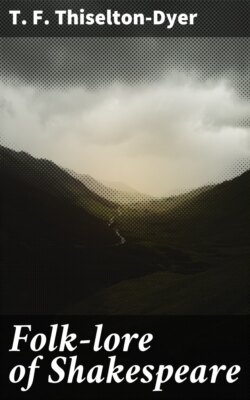Читать книгу Folk-lore of Shakespeare - T. F. Thiselton-Dyer - Страница 15
На сайте Литреса книга снята с продажи.
TRANSMIGRATION OF SOULS.
ОглавлениеTable of Contents
Shakespeare has several references to the old superstitious belief in the transmigration of souls, traces of which may still be found in the reverence paid to the robin, the wren, and other birds. Thus, in “The Merchant of Venice” (iv. 1), Gratiano says to Shylock:
“Thou almost makest me waver in my faith
To hold opinion with Pythagoras
That souls of animals infuse themselves
Into the trunks of men: thy currish spirit
Govern’d a wolf, who, hang’d for human slaughter,
Even from the gallows did his fell soul fleet,
And, whilst thou lay’st in thy unhallow’d dam,
Infused itself in thee; for thy desires
Are wolfish, bloody, starved, and ravenous.”
Caliban, when remonstrating with the drunken Stephano and Trinculo, for delaying at the mouth of the cave of Prospero, instead of taking the magician’s life (“Tempest,” iv. 1), says:
“I will have none on’t: we shall lose our time,
And all be turn’d to barnacles, or to apes.”
In “Hamlet” (iv. 5), in the scene where Ophelia, in her mental aberration, quotes snatches of old ballads, she says: “They say the owl was a baker’s daughter! Lord, we know what we are, but know not what we may be.”[81]
Again, in “Twelfth Night” (iv. 2), there is another reference in the amusing passage where the clown, under the pretence of his being “Sir Topas, the curate,” questions Malvolio, when confined in a dark room, as a presumed lunatic:
“Mal. I am no more mad than you are: make the trial of it in any constant question.
Clo. What is the opinion of Pythagoras concerning wild fowl?
Mal. That the soul of our grandam might haply inhabit a bird.
Clo. What thinkest thou of his opinion?
Mal. I think nobly of the soul, and no way approve his opinion.
Clo. Fare thee well. Remain thou still in darkness: thou shalt hold the opinion of Pythagoras ere I will allow of thy wits, and fear to kill a woodcock lest thou dispossess the soul of thy grandam.”
Although this primitive superstition is almost effete among civilized nations, yet it still retains an important place in the religious beliefs of savage and uncivilized communities.
